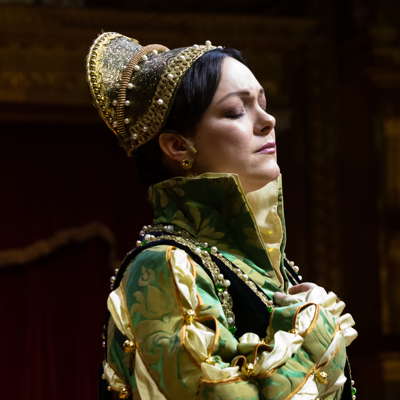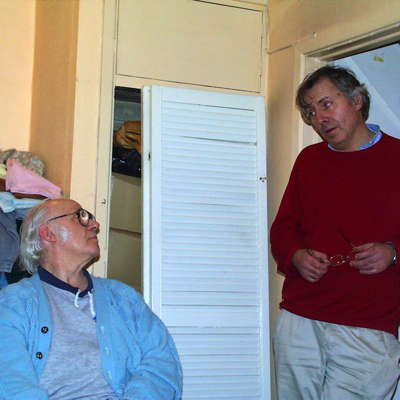 25 YEARS: Classical Music Daily celebrates twenty-five years of daily publication with an hour-long video featuring some of our regular contributors.
25 YEARS: Classical Music Daily celebrates twenty-five years of daily publication with an hour-long video featuring some of our regular contributors.
OF MAJOR INTERNATIONAL INTEREST

GIUSEPPE PENNISI looks forward to
a summer of opera in Italy
a summer of opera in Italy
Italy is sunny in the summer, and many Italians and foreigners choose vacation places near beaches and mountains. It is the location of several summer music festivals. However, care is required when choosing a festival. Last year, I counted thirty-five festivals during the period from mid-June to mid-September, in the operatic field alone. Many of them are of little artistic value, organized by travelling companies, mostly from Eastern and Central Europe, with low-cost productions of repertory titles as entertainment to enjoy after a day spent swimming.
The father of all Italian summer festivals is the Arena di Verona where the open-air theatre holds an audience of 16,000. Thus, it has very popular titles. From the end of June until early September it features a new production of La Traviata, two ballets and revivals of Carmen, Aida, Il Trovatore and Tosca, as well as a gala to celebrate fifty years of its partnership with Plácido Domingo. It has a rich web site in several languages, and tickets are already on sale.
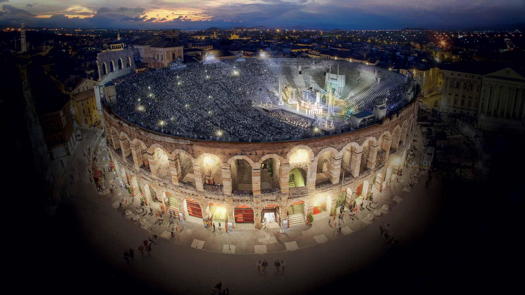
The Arena di Verona, where the 2019 Opera Festival runs from 21 June until 7 September
Another old-timer is the Spoleto Festival or Festival of Two Worlds founded by Giancarlo Menotti. After a period of difficulties, the Festival (28 June-14 July 2019) has been undergoing a revival over the last six years. Its emphasis is more on drama than on music. The detailed program of this sixty-second edition will be available in May. Nonetheless, it is anticipated that there will be the world premiere of Proserpina by Silvia Colasanti and that the final Concerto in Piazza will be devoted to Verdi's music performed by the Teatro dell'Opera di Roma orchestra, with chorus and soloists under the baton of Daniele Gatti.
The two festivals which attract a large non-Italian audience and several music reviewers from abroad are the Rossini Opera Festival (ROF) and the Ravenna Festival. ROF is known as the Italian Bayreuth due to its care for philology and its close association with the scholarly Rossini Foundation. Ravenna Festival is named the Italian Salzburg for its duration and the variety of its proposals in magnificent Byzantine antiquities, a lovely nineteenth century opera house and a large modern concert hall.
As usual, ROF (11-23 August 2019) offers two new productions (Semiramide and Demetrio e Polibio) and two revivals (L'Equivoco Stravagante and Il Viaggio a Reims) as well as a large number of concerts. The performances are scheduled in a way that one can spend a full week in Pesaro without getting bored on a single evening, and enjoying the Adriatic seaside in the mornings. Demand for tickets is quite strong; normally, many performances are sold out by late spring. The festival has groups of fans who come every year from Italy and abroad. Some of these fans also feed a more recent festival in Germany, in the Black Forest, called Rossini in Bad Wildbad.
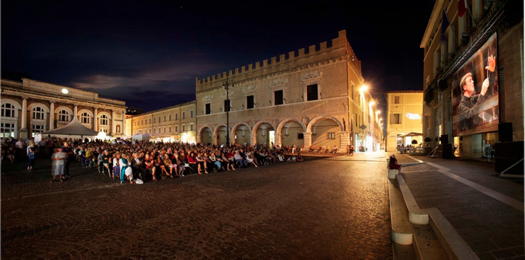
An event in the piazza at the Rossini Opera Festival in Pesaro
The Ravenna Festival is a monumental event at its thirtieth edition: from 5 June to 16 July and from 1 to 10 November 2019. In Summer 2019, the theme is 'open sea'. It will be developed mostly in concerts - Riccardo Muti, Maurizio Pollini, Leōnidas Kavakos, Emmanuelle Krivine and the Tallis Scholars, just to mention a few names, ballet - Hamburg Ballett and the Martha Graham Dance Company, and a staged version of Dante's Purgatory. Riccardo Muti will open the Festival on 5 June in a concert with Maurizio Pollini. With the Cherubini orchestra, chorus and soloists - Italians and Greeks, Muti will conduct Beethoven's Ninth Symphony in Ravenna on 11 July and immediately thereafter in Athens. Opera - Norma, Aida and Carmen: three new productions - will be the program of the Fall Festival. In the Summer Festival there are several performance a day in various venues (like in Salzburg); the most requested performances are sold out in the Spring. The opera Fall Festival is held in an 800 seat theatre and is directed by Cristina Mazzavillani Muti; in 2018, about one third of the orchestra seats were sold well in advance to groups from France, Germany and Northern Europe.
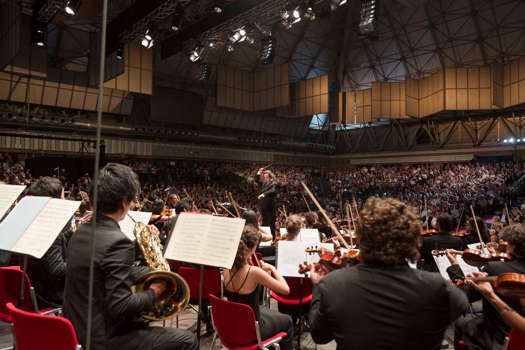
Riccardo Muti conducting at the Pala de Andrè in Ravenna. Photo © 2016 Silvia Lelli
The Puccini Festival has a 4,000 seat arena in a village where the composer lived on the shore of a lake and in front of engrossing mountains. The arena was built with the purpose of having decent acoustics in spite of its size and its open-air location. From 16 July to 26 August 2019, the festival will include new productions and revivals of as many as seven Puccini titles, as well a performance of Verdi's Aida, always sought in huge arenas. Angela Georghiu will be the protagonist in La bohème, the opera in which she made her debut in 1992 at the Royal Opera House in London.
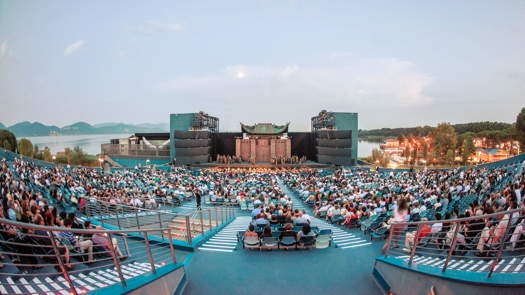
The Gran Teatro Giacomo Puccini in Torre del Lago. Photo © 2013 Giorgio Andreuccetti
The festivals mentioned above are considered by Italian legislation 'of major international interest' and receive a special grant from the Government. Independent studies by Italian universities of the ROF, Ravenna Festival and Puccini Festival show that every euro of public grant yields between four and six euros of value added in the festivals' specific areas.
The Sferisterio Festival in Macerata and Valle d'Itria Festival in Martina Franca are of artistic interest too. The former has an excellent acoustic, even though it is in open air, due to the peculiar arena originally built for sports. It features a new production of Carmen, and the revival of Rigoletto, as well as of a staging of Macbeth reviewed here at its 2018 debut in Palermo - 'Sex and Power', 29 January 2018.
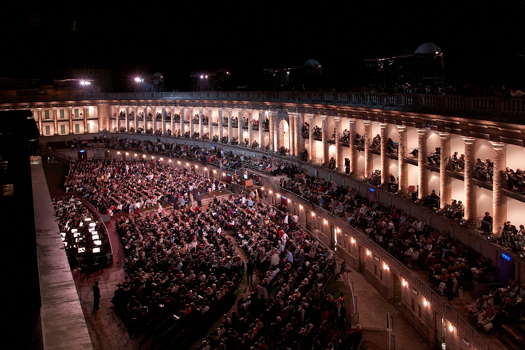
An event at the Sferisterio Festival
The Valle d'Itria Festival features forgotten operas of the past. This forty-fifth edition has two interesting unknown operas - Ecuba by Nicola Antonio Manfroce and Orfeo by Nicola Porpora, in addition to the better known but seldom produced Il Matrimonio Segreto by Domenico Cimarosa.
Rome, Italy



